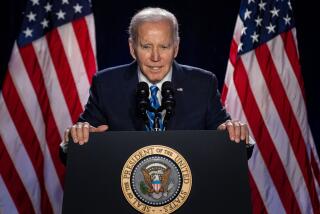Bush Complains of Persistent Congressional Meddling : Government: President accuses lawmakers of trying to gain power at expense of White House. Stance could worsen his relations with Capitol Hill.
- Share via
PRINCETONJ. — President Bush defended his office Friday against what he characterized as persistent congressional meddling, accusing legislative leaders of seeking to accumulate power by “micromanaging” White House decisions.
In a speech dedicating a social science complex at Princeton University, Bush renewed a favorite theme of his Administration, arguing that the executive branch must be protected against unwarranted congressional intrusion.
He noted that the President and vice president are the only government officials elected by the entire nation and said his office “commands a view of the whole ground, while Congress necessarily adopts the views of its constituents.”
Bush, who served two terms in the House of Representatives, has made defense of executive authority a personal priority of his presidency by vetoing bills that he said he feared would overextend the authority of the legislative branch--even when he agreed with their general intent.
Bush has vetoed 20 bills so far, and Congress has yet to override him. The President said that six of those vetoes were cast to kill bills that he otherwise supported because he believed that signing them would have eroded the authority of his office.
That strategy is likely to continue, he suggested. Bush said it is his “constitutional obligation to protect his office” when Congress “sometimes tries to micromanage the executive branch by writing too specific directions for carrying out a particular law.”
Bush’s strong words drew sharp replies from Capitol Hill, with one congressional staff member predicting that the President’s comments would worsen relations with the Democratic-controlled Congress.
“What the White House describes as micromanagement is, in many cases, Congress’ reaction to executive branch disregard for clear and broad general principles of legislation,” the staff member said, adding that lawmakers would not be intimidated by Bush’s veto power. “Congress is going to continue to spell out what it feels needs to be done in important areas of foreign and domestic policy.”
Rep. David Dreier (R-La Verne) said Bush’s comments probably reflect his growing frustration with being second-guessed by Democratic lawmakers. “This may be his way of releasing a measure of frustration,” he said. “Congress has a role, but I agree with him that we may be involving ourselves too much.”
Bush’s speech, his first outside of Washington since being hospitalized last weekend for treatment of an irregular heartbeat, is one in a series of planned domestic addresses on college campuses this spring.
On Sunday, Bush is to deliver the commencement address at Hampton University in Hampton, Va. He spoke at the University of Michigan last Saturday before suffering the irregular heartbeat that sent him to the hospital later in the day.
Princeton awarded an honorary degree to Bush, who was graduated from Ivy League rival Yale in 1948. It was the 16th such degree granted to a U.S. President by Princeton. During the award ceremony, Bush made light of his health scare by thanking the school from “my formerly fibrillating heart.”
In his remarks during the dedication, Bush accused congressional leaders of trying to grab power for themselves by weakening the presidency and wasting federal dollars to boot.
“The most common challenge to presidential powers comes from a predictable source . . . the United States Congress,” Bush said.
Each year, Bush said, Administration defense officials must respond to more than 750,000 requests for information and other congressional inquiries, a time-consuming process that he characterized as largely unnecessary.
“Although our founders never envisioned a Congress that would churn out hundreds of thousands of pages worth of reports and hearings and documents and laws every year, they did understand that legislators would try to accumulate power,” Bush said.
Bush quoted former President James Madison, a Princeton graduate, who said that Congress was busy “everywhere extending the sphere of its activity and drawing all power into its impetuous vortex.”
Often, Bush charged, lawmakers do not even know what is contained in the bills they approve, noting that questionable undertakings such as federal grants to study “cow belches or a Lawrence Welk Museum” are hidden in bills supported by many House and Senate members.
“They’re so complex,” he said. “Things are added in the dark of the night.”
Bush repeated his call for a line-item veto, which would give him the authority to strike specific provisions contained in legislation without killing entire bills. It was the only comment that drew applause during Bush’s 15-minute speech.
More to Read
Get the L.A. Times Politics newsletter
Deeply reported insights into legislation, politics and policy from Sacramento, Washington and beyond. In your inbox twice per week.
You may occasionally receive promotional content from the Los Angeles Times.








